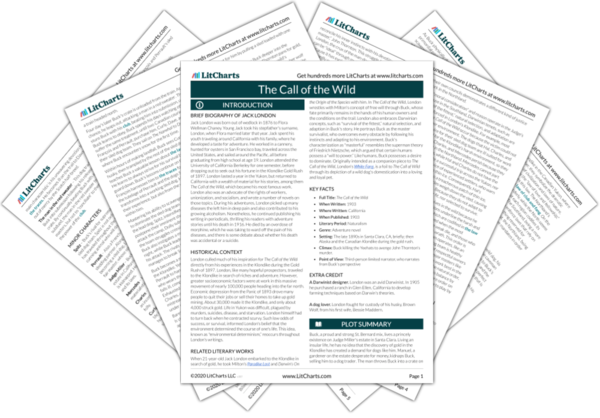When Jack London embarked to the Klondike in search of gold, he brought two seminal works with him, Milton's Paradise Lost, and Charles Darwin's On the Origin of the Species. The latter's influence is evidenced by the ways in which nature administers the law. When Buck attacks a man to defend John Thornton, the miners set up a mock court to settle this dispute on the frontier. That they set up their own councils demonstrates a different kind of justice at work in the Northland.
While "moral consideration” and reason operate in the Judge's courthouse in the Southland, Darwinian tenets, such as "survival of the fittest,” natural selection, and adaptation are actively enforced in London's Klondike. For example, most deaths in The Call of the Wild occur because the victim could not adapt to his/her environment. The dogs that Hal, Charles, and Mercedes acquire for their sled dog team are ill suited for work in the traces and for the Klondike's harsh environment, so they die. Similarly, Hal, Charles, and Mercedes perish because they cannot adapt to life in the Northland. Mercedes cannot part from her possessions, while Hal and Charles do not have the wherewithal to execute a successful trip across the Yukon, nor do they listen to the advice of experienced settlers, who warn them against traveling on thin ice. Consequently, Hal's ignorance leads his team to a treacherous patch of thin ice, while Mercedes' heavy articles weigh down the sled, causing the ice to cave beneath them. Because they do not adapt to nature's ways, they are neither fit, nor selected to survive.
In contrast, Buck excels and survives in the wild because he follows his instincts. Such distinctions underline the harsh and brutal character of nature's laws, which are codified in the law of club and fang—wild justice is served when the most adaptive survive, the strong thrive, the weak die, and those who disrespect nature's laws suffer nature's wrath. This order is reflected in the way that the sled dog team operates, like an organism within an ecosystem. The sled dog team is healthy and thrives in the wild under the direction of respectful owners like François and Perrault, but suffers under poor masters like Hal, Charles, and Mercedes. Similarly, the dogs work best in the traces when every dog knows his place within the natural order, but falls into some disorder when Buck upsets this balance by overthrowing Spitz. However, Buck is able to restore order on the team when he takes over because he knows how to play by nature's rules.
Wild Law and Order ThemeTracker

Wild Law and Order Quotes in The Call of the Wild
He was beaten (he knew that); but he was not broken. He saw once for all, that he stood no chance against a man with a club. He learned the lesson, and in all his after life he never forgot it. That club was a revelation. It was his introduction to the reign of primitive law. Again and again, as he looked at each brutal performance, the lesson was driven home to Buck: a man with a club was a lawgiver, a master to be obeyed, though not necessarily conciliated.

Unlock explanations and citation info for this and every other The Call of the Wild quote.
Plus so much more...
Get LitCharts A+He had been suddenly jerked from the heart of civilization and flung into the heart of things primordial. No lazy, sun-kissed life was this, with nothing to do but loaf and be bored. Here was neither peace, nor rest, nor a moment's safety. All was confusion and action, and every moment life and limb were in peril. There was imperative need to be constantly alert; for these dogs and men were not town dogs and men. They were savages, all of them, who knew no law but the law of club and fang.
So that was the way. No fair play. Once down, that was the end of you.
This first theft marked Buck as fit to survive in the hostile Northland environment. It marked his adaptability, his capacity to adjust himself to changing conditions, the lack of which would have meant swift and terrible death.
It was inevitable that the clash for leadership should come. Buck wanted it. He wanted it because it was his nature, because he had been gripped tight by that nameless, incomprehensible pride of the trail and trace—that pride which holds dogs in the toil to the last gasp, which lure them to die joyfully in the harness, and breaks their hearts if they cut out of the harness.
The insidious revolt led by Buck had destroyed the solidarity of the team. It no longer was as one dog leaping in the traces.
Dave resented being taken out, grunting and growling while the traces were unfastened, and whimpering brokenheartedly when he saw Sol-leks in the position he had held and served so long. For the pride of trace and trail was his, and sick, unto death, he could not bear that another dog should do his work.
He had killed man, the noblest game of all, and he had killed in the face of the law of club and fang.











